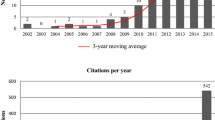Abstract
This paper analyzes data from the British Household Panel Survey on households' financial management and financial decision-making. Direct subjective information was collected by asking questions like ‘Who has the final say in big financial decisions?’. All questions were answered separately by both partners. We consider two competing models explaining how finances are organized. The first model is based on a household production approach, in which behaviour is determined by an efficient allocation of both partners' time to market work, financial management, and leisure. In the second model, which is game-theoretic in nature, financial management is a reflection of bargaining power. The two models have different implications for the effect of explanatory variables, in particular wages, on the dependent variables. Empirical results indicate that financial management is primarily determined by bargaining considerations.
Similar content being viewed by others
REFERENCES
Antonides, G. and A.J.M. Hagenaars, 1992, The Distribution of Welfare in the Household, mimeo, Erasmus University Rotterdam.
Barmby, T., 1996, 'Computation of Nash-Bargained Models of Household Labour Supply,' Bulletin of Economic Research, 48, pp. 161-165.
Blood, R.O. and D.M. Wolfe, 1960, Husbands and Wives: The Dynamics of Married Living, New York, Free Press.
Blumstein, P. and P. Schwarz, 1983, American Couples, New York, Morrow.
Harding, S., 1986, The Science Question in Feminism, Ithaca, NY, Cornell University Press.
Kooreman, P. and A. Kapteyn, 1990, 'On the Empirical Implementation of Some Game Theoretic Models of Household Labor Supply,' Journal of Human Resources, 25, pp. 584-598.
McDonald, G.W., 1980, 'Family Power: The Assessment of a Decade of Theory and Research, 1970-1979,' Journal of Marriage and the Family, 42, pp. 841-854.
McElroy, M.B., 1990, 'The Empirical Content of Nash-Bargained Household Behavior,' Journal of Human Resources, 25, pp. 559-583.
Mizan, A.N., 1994, 'Family Power Studies: Some Major Methodological Issues,' International Jour-nal of Sociology of the Family, 24, pp. 85-91.
Olson, D.H. and C. Rabunsky, 1972, 'Validity of Four Measures of Family Power,' Journal of Mar-riage and the Family, 34, pp. 224-234.
Ott, N., 1992, Intrafamily Bargaining and Household Decisions, New York, Springer Verlag.
Pahl, J., 1980, 'Patterns of Money Management within Marriage,' Journal of Social Policy, 9, pp. 313-335.
Safilios-Rothschild, C., 1970, 'The Study of Family Power Structure: A Review of 1960-1969,' Journal of Marriage and the Family, 32, pp. 94-104.
Taylor, M.F. (ed.), 1992, British Household Panel Survey User Manual Volume A & B, Colchester, University of Essex.
Treas, J., 1991, 'The Common Pot or Separate Purses? A Transaction Costs Interpretation,' in: R.L. Blumberg (ed.), Gender, Family and Economy: The Triple Overlap, Newbury Park, Sage.
Turk, J.L. and N.W. Bell, 1972, 'Measuring Power in Families,' Journal of Marriage and the Family, 34, pp. 215-223.
Vogler, C. and J. Pahl, 1994, 'Money, Power and Inequality within Marriage,' Sociological Review, 42, pp. 263-288.
Author information
Authors and Affiliations
Rights and permissions
About this article
Cite this article
Dobbelsteen, S., Kooreman, P. Financial Management, Bargaining and Efficiency within the Household; an Empirical Analysis. De Economist 145, 345–366 (1997). https://doi.org/10.1023/A:1003008229588
Issue Date:
DOI: https://doi.org/10.1023/A:1003008229588




